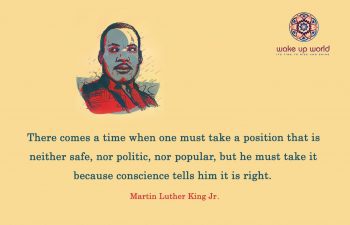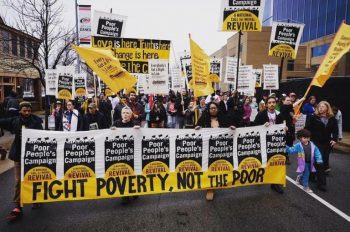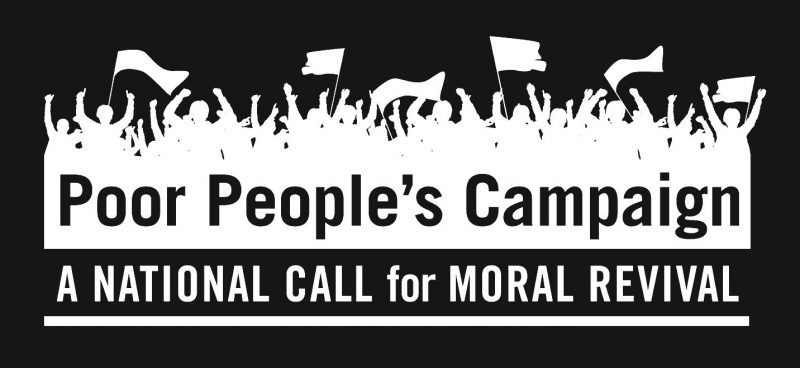May 28th, 2018
Guest writer for Wake Up World
Poor people of all races are shifting the national conversation on poverty and race from “right vs. left” to “right vs. wrong”.
Thousands of civil rights advocates, low-wage workers, and religious leaders kicked off massive protests on May 14, launching a 40-day campaign across the nation in an effort to revive Martin Luther King’s Poor People’s Campaign.
The Poor People’s Campaign brings together poor and marginalized people from all backgrounds, places, and religions to stand up for their lives and rights by calling for a “revolution of American values.” They’re taking aim at the evils of systemic racism, poverty, the war economy, and ecological devastation.
King’s Dream Included Economic Equality, Not Just Racial Equality
Martin Luther King Jr. didn’t just criticize racial segregation, he called for an end to economic injustice.
King identified three evils plaguing western civilization in a speech at the National Conference on New Politics in 1967. The United States, King said, is suffering from “the sickness of racism, excessive materialism, and militarism” — a sickness that “has been lurking within our body politic from its very beginning.”
“We have deluded ourselves into believing the myth that capitalism grew and prospered out of the Protestant ethic of hard work and sacrifice,” King observed. But “the fact is capitalism was built on the exploitation and suffering of black slaves and continues to thrive on the exploitation of the poor — both black and white, both here and abroad.”
King foreshadowed that if we maintain our exploitative economic and political systems, then we’d get not only racial apartheid, but economic apartheid as well.
He was right. Nearly 51 years after that speech, we’re still heading in that direction.
King called for a “radical redistribution of political and economic power” in order to end those three evils. Now is the time for this necessary radical change. We must channel MLK’s revolutionary spirit into an effort to reshape America’s values to ensure justice for all — “both black and white, both here and abroad.”
Shifting the National Conversation on Poverty and Race
The first Poor People’s Campaign in 1968 brought thousands of Americans of all races together to fight for fair incomes and living standards. After King was murdered that same year, the movement slowed down. But with the fights for racial and economic equality as intertwined now as they were 50 years ago, organizers believe that the movement’s vision for America couldn’t come at a better time.
The Poor People’s campaign calls not only for a radical redistribution of political and economic power, but for a deep moral analysis of the national consciousness around poverty and racism.
This analysis calls out the common myths that perpetuate systemic inequality, including the dangerous belief that poverty is the fault of the poor. Those with more than ample wealth, the narrative goes, fully merit what they have. And others merit less.
My colleague Chuck Collins describes this narrative as the “myth of deservedness.” In his book Born on Third Base, Collins defines that myth as the belief “that people are poor because they don’t try as hard, have made mistakes, or lack wit and wisdom.” And the rich, the same story goes, have worked “harder, smarter, or more creatively.”
This “deservedness” narrative largely ignores the discrimination and other barriers that have blocked economic progress for poor people and people of color, or the public policies that have kept these barriers intact — things like housing and employment discrimination, mass incarceration, and tax policies that favor the wealthy over poor people of all colors.
A report released this year by the Institute for Policy Studies, The Souls of Poor Folks, examines how what Dr. King called the “Triplets of Evil” — systemic racism, poverty, and the war economy and militarism — as well as the interrelated problem of ecological devastation, have deepened since 1968 because of structural and systemic reasons, rather than individual failures.
The report points out that since 1968, the top 1 percent’s share of national income has nearly doubled, while the official poverty rate for all U.S. families has merely inched up and down. The 400 wealthiest Americans now own more wealth than the bottom 64 percent of the U.S. population (or 204 million people).
As the government increasingly caters to the interests of the few rich and powerful rather than being accountable to the poor and marginalized majority, the Poor People’s Campaign reminds us of the ongoing and emerging movements that are compelling a change in our national priorities.
During a time where America couldn’t be more politically and economically polarized, it’s time to change the moral narrative in this country by coming together under moral clarity. We must shift the national conversation from “right versus left” to “right versus wrong.”
The Poor People’s Campaign is currently organizing events in over 30 states. Learn more about how you can get involved at www.poorpeoplescampaign.org.
About the author:











